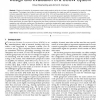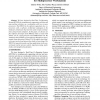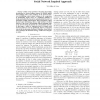2171 search results - page 14 / 435 » Cooperative Validation in Distributed Control Systems Design |
113
click to vote
TSE
1998
15 years 1 months ago
1998
—Design and evaluation of groupware systems raise questions which do not have to be addressed in the context of single user systems. The designer has to take into account not onl...
111
click to vote
HICSS
1996
IEEE
15 years 5 months ago
1996
IEEE
: We have designed a Real-Time Co-Operating System (RTCOS) for simultaneously supporting real-time and non-real-time activities on a workstation with two or more processors. The RT...
103
click to vote
IPPS
2007
IEEE
15 years 7 months ago
2007
IEEE
Many modern massively distributed systems deploy thousands of nodes to cooperate on a computation task. Network congestions occur in these systems. Most applications rely on conge...
CEC
2007
IEEE
15 years 7 months ago
2007
IEEE
— Online service provision is becoming increasingly decentralized as system designers pursue the benefits gained from utilizing nodes at the periphery of the network. However, d...
77
Voted
CAISE
2006
Springer
15 years 5 months ago
2006
Springer
Deviational analysis is a traditional way of exploring the safety of systems. The results of deviational analysis contribute to traditional safety cases and safety arguments. We ex...



